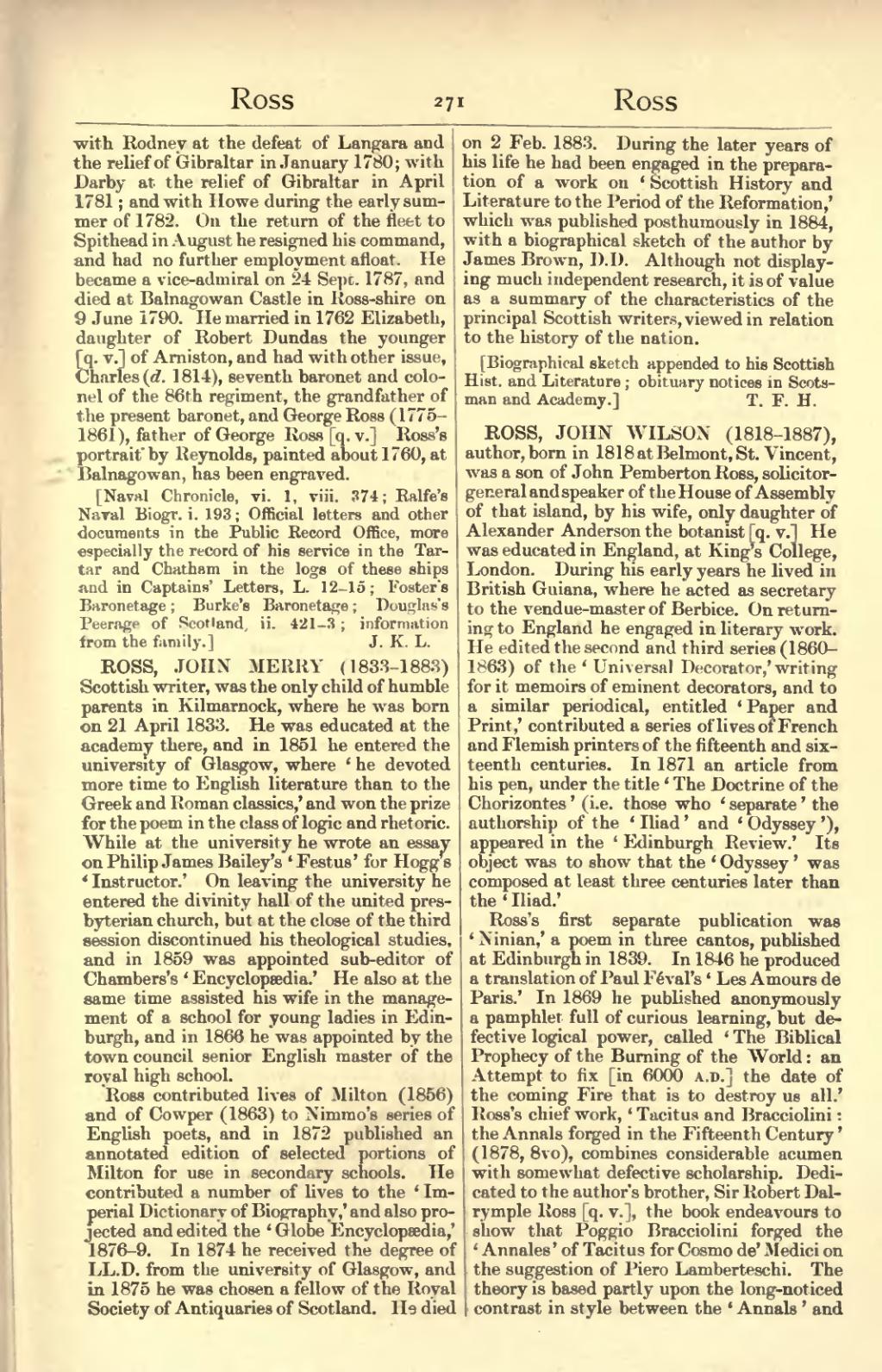with Rodney at the defeat of Langara and the relief of Gibraltar in January 1780; with Darby at the relief of Gibraltar in April 1781; and with Howe during the early summer of 1782. On the return of the fleet to Spithead in August he resigned his command, and had no further employment afloat. He became a vice-admiral on 24 Sept. 1787, and died at Balnagowan Castle in Ross-shire on 9 June 1790. He married in 1762 Elizabeth, daughter of Robert Dundas the younger [q. v.] of Arniston, and had with other issue, Charles (d. 1814), seventh baronet and colonel of the 86th regiment, the grandfather of the present baronet, and George Ross (1775–1861), father of George Ross [q. v.] Ross's portrait by Reynolds, painted about 1760, at Balnagowan, has been engraved.
[Naval Chronicle, vi. 1, viii. 374; Ralfe's Naval Biogr. i. 193; Official letters and other documents in the Public Record Office, more especially the record of his service in the Tartar and Chatham in the logs of these ships and in Captains' Letters, L. 12–15; Foster's Baronetage; Burke's Baronetage; Douglas's Peerage of Scotland, ii. 421–3; information from the family.]
ROSS, JOHN MERRY (1833–1883), Scottish writer, was the only child of humble parents in Kilmarnock, where he was born on 21 April 1833. He was educated at the academy there, and in 1851 he entered the university of Glasgow, where ‘he devoted more time to English literature than to the Greek and Roman classics,’ and won the prize for the poem in the class of logic and rhetoric. While at the university he wrote an essay on Philip James Bailey's ‘Festus’ for Hogg's ‘Instructor.’ On leaving the university he entered the divinity hall of the united presbyterian church, but at the close of the third session discontinued his theological studies, and in 1859 was appointed sub-editor of Chambers's ‘Encyclopædia.’ He also at the same time assisted his wife in the management of a school for young ladies in Edinburgh, and in 1866 he was appointed by the town council senior English master of the royal high school.
Ross contributed lives of Milton (1856) and of Cowper (1863) to Nimmo's series of English poets, and in 1872 published an annotated edition of selected portions of Milton for use in secondary schools. He contributed a number of lives to the ‘Imperial Dictionary of Biography,’ and also projected and edited the ‘Globe Encyclopædia,’ 1876–9. In 1874 he received the degree of LL.D. from the university of Glasgow, and in 1875 he was chosen a fellow of the Royal Society of Antiquaries of Scotland. He died on 2 Feb. 1883. During the later years of his life he had been engaged in the preparation of a work on ‘Scottish History and Literature to the Period of the Reformation,’ which was published posthumously in 1884, with a biographical sketch of the author by James Brown, D.D. Although not displaying much independent research, it is of value as a summary of the characteristics of the principal Scottish writers, viewed in relation to the history of the nation.
[Biographical sketch appended to his Scottish Hist. and Literature; obituary notices in Scotsman and Academy.]
ROSS, JOHN WILSON (1818–1887), author, born in 1818 at Belmont, St. Vincent, was a son of John Pemberton Ross, solicitor-general and speaker of the House of Assembly of that island, by his wife, only daughter of Alexander Anderson the botanist [q. v.] He was educated in England, at King's College, London. During his early years he lived in British Guiana, where he acted as secretary to the vendue-master of Berbice. On returning to England he engaged in literary work. He edited the second and third series (1860–1863) of the ‘Universal Decorator,’ writing for it memoirs of eminent decorators, and to a similar periodical, entitled ‘Paper and Print,’ contributed a series of lives of French and Flemish printers of the fifteenth and sixteenth centuries. In 1871 an article from his pen, under the title ‘The Doctrine of the Chorizontes’ (i.e. those who ‘separate’ the authorship of the ‘Iliad’ and ‘Odyssey’), appeared in the ‘Edinburgh Review.’ Its object was to show that the ‘Odyssey’ was composed at least three centuries later than the ‘Iliad.’
Ross's first separate publication was ‘Ninian,’ a poem in three cantos, published at Edinburgh in 1839. In 1846 he produced a translation of Paul Féval's ‘Les Amours de Paris.’ In 1869 he published anonymously a pamphlet full of curious learning, but defective logical power, called ‘The Biblical Prophecy of the Burning of the World: an Attempt to fix [in 6000 A.D.] the date of the coming Fire that is to destroy us all.’ Ross's chief work, ‘Tacitus and Bracciolini: the Annals forged in the Fifteenth Century’ (1878, 8vo), combines considerable acumen with somewhat defective scholarship. Dedicated to the author's brother, Sir Robert Dalrymple Ross [q. v.], the book endeavours to show that Poggio Bracciolini forged the ‘Annales’ of Tacitus for Cosmo de' Medici on the suggestion of Piero Lamberteschi. The theory is based partly upon the long-noticed contrast in style between the ‘Annals’ and
